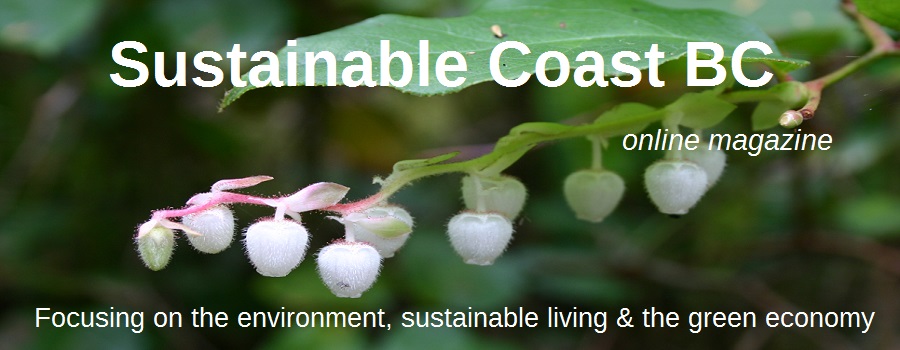Features
- Details
- Written by Beverly Saunders Beverly Saunders
- Category: Transitioning Transitioning
- Published: 29 July 2015 29 July 2015
“You have the power to change the world.”
Two small groups in Langdale and Gibsons put that statement to the test during a recent neighbourhood initiative called Transition Streets. Designed by Transition Town Totnes, UK, the local program was launched in these two locations as a pilot project by Sunshine Coast in Transition [SCiT] and the Earth Stewardship Pilot Project.
Each of these two small groups came together over seven sessions. The goal? To empower themselves and each other to reduce energy consumption, save money and build community.
Small Actions
When looking at the challenges we face at this time in history, how many of us have ever spoken or thought these words:
“But I'm just one person, how can I make a difference?”
“I don't have time to do any more.”
“I already recycle. What else can I do?”
But what if you could identify and reduce your daily costs of living while at the same time feel you were making a real contribution?
The Japanese word Kaizen means any improvement, one-time or continuous, done in small manageable stages. While it's quite daunting for individuals to consider massive action in any area of life, continuous and surprisingly substantial improvement can be made by adding small incremental steps to a daily routine.
Collective mountains can grow out of individual molehills.
The participants in both groups had to stretch themselves to learn new information and make commitments to action in five different areas:
1. energy
2. transportation
3. water
4. waste
5. food
The Langdale group chose a slower pace of seven meetings over seven months. The Gibsons group completed their program by holding their meetings every three weeks. Regardless of the frequency of the seven sessions a lot was accomplished both in a practical sense and in each participant's level of awareness. By discussing and sharing ideas and resources, and by supporting each other to take small actions, each participant experienced a sense of self empowerment and the increasing capacity to make meaningful changes.
Individual Action within Community
As we face the challenges in our current world, two dangers we confront are apathy and feelings of helplessness and hopelessness. It sometimes seems easier to ignore the problems and carry on as if everything is fine. The support and camaraderie of friends and neighbours can provide the impetus to up-level our awareness, and give us the energy and willingness to make simple lifestyle changes in our use of energy, in how we get around, or in how we use our precious resource of water.
Some of the actions taken were very easy to implement, and were more a matter of advanced planning and self reminders. Some examples are:
1. one trip into town with multiple errands rather than several trips
2. turning down the thermostat at night
3. turn lights off when leaving a room
4. taking reusable bags to the grocery store instead of using plastic or paper
5. dry laundry on a clothesline instead of in the dryer
Some actions were more challenging either time wise or money wise. Some examples are:
1. collect rainwater for lawn and garden
2. fix leaks and drips and install a low flow showerhead
3. compost at home
4. grow your own food
5. use a car co-op or lift share
Those actions were important, but equally important was a less concrete result. Throughout, both groups noted as some of the satisfying aspects of the project:
1. the deeper more meaningful conversations about the things that matter most
2. the personal connections with each other and building a feeling of community
3. the resources – some known, and some not – that we have available to us locally
Once the seven sessions are completed, including self evaluations both before and after, what comes next?
What Comes Next?
As individuals, each person can commit to continuing with whatever they started to do during the project. Or they can take on a larger long-term project they were unable to do during the project schedule, e.g., an outdoor project which would be better done in warmer sunnier weather.
In addition, each group can carry on together with re-skilling type workshops and even a larger neighbourhood project like a community garden. Both the Langdale group and the Gibsons group indicated that they wanted to maintain and strengthen the connections they made.
It is the goal of Sunshine Coast in Transition to have these programs running continually in new areas on the Coast.
Although the first phase of the pilot is over for Langdale & Gibsons, we have interested residents in Granthams Landing and Roberts Creek hoping to start up neighbourhood groups soon.
If you're interested in starting a group in your neighbourhood, a coordinator can help you get started. Please contact SCiT at This email address is being protected from spambots. You need JavaScript enabled to view it. attention Leonie & Katherine, or phone 604 886 8769
Imagine the impact if every community had multiple Transition Streets programs going on simultaneously from Langdale to Sechelt and beyond.
"Never doubt that a small group of thoughtful, committed citizens can change the world; indeed, it's the only thing that ever has." - Margaret Mead.
Sunshine Coast in Transition is part of a global network that inspires us all to imagine and create a vibrant future that has alternatives to fossil fuels. We embrace building local resilience which is ecologically sustainable while nurturing and celebrating our community. More Info: www.sunshinecoastintransition.wordpress.com/education
